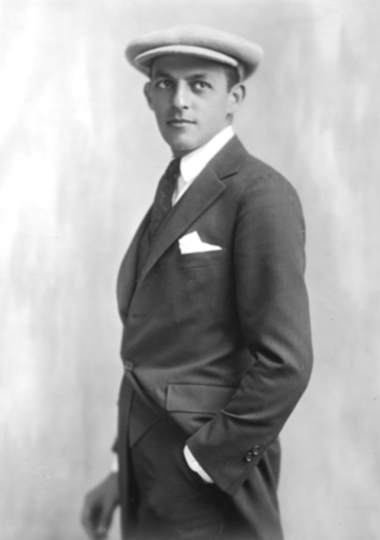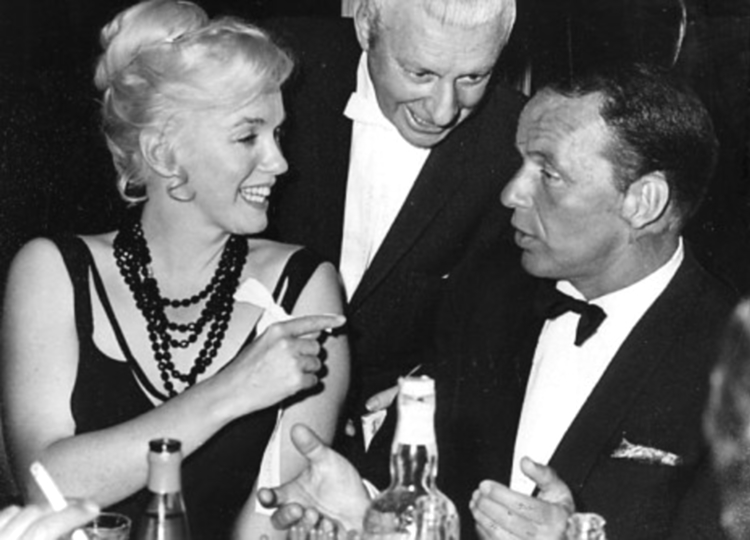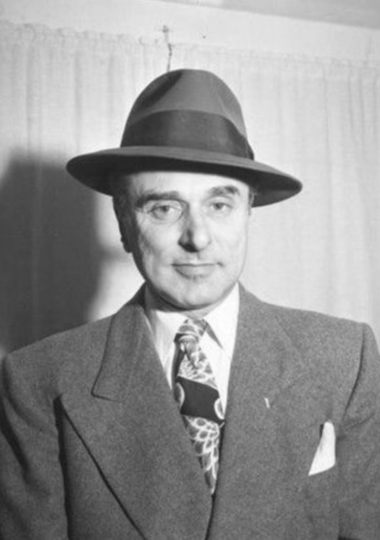Double Cross and Sam Giancana's Half Brother
Based entirely on memories recalled four decades after the fact, Chuck Giancana, Sam Giancana’s half brother, dictated to his son, also named Sam in honor of his uncle, an odd quasi biography entitled Double Cross: The Explosive, Inside Story of the Mobster Who Controlled America. Therein, Chuck asserted unequivocally that Marilyn was an Outfit pawn, a lost and hapless drug addled alcoholic who was sleeping with virtually every mobster from Los Angeles to New York City and from Chicago to Havana. According to Chuck, Marilyn’s association and obligation to the Outfit had existed over a long period of time.
Marilyn’s first real break in Hollywood, according to Double Cross, came through her lover, Joseph Schenck, a Hollywood producer who became embroiled in the already mentioned union bribery scheme perpetrated by George Browne and Willie Bioff in the late-nineteen-thirties and early-nineteen-forties. In Chuck’s account, Schenck was deeply involved in bribery along with income tax code violations, for which federal authorities tried, convicted and imprisoned Schenck. By the time Schenck met Marilyn and they began their frequently alleged intimate affair, not long after his release from prison, the former producer was already seventy years old; but despite his age, and his bribery conviction, Schenck remained an important and powerful force in Hollywood. Apparently he also remained a powerful force sexually, even at the age of seventy.
Allegedly, Joe Schenck introduced Marilyn to Handsome Johnny Roselli. The young starlet impressed Roselli; so he introduced Marilyn to Sam Giancana, a mafia don always interested in potential movie stars. According to his half brother’s account, after meeting Marilyn, Sam and the Chicago Outfit quietly and privately promoted her career and eventually introduced her to Horrible Harry Cohn.
On its face, Chuck’s account of Marilyn’s early Hollywood career appears to corroborate John Tuohy’s account; but the Double Cross excerpt also has serious historical and accuracy problems along with a few incongruities. For example, if Joe Schenck was Marilyn’s mobster lover, as alleged by Chuck Giancana, why was Schenck missing from Tuohy’s account of Marilyn’s early career and her association with Harry Cohn? Odd that Tuohy did not mention Schenck since: 1) Marilyn actually met Schenck on the back lots at 20th Century-Fox in late 1946 not long after she signed her initial contract with that studio; and 2) Schenck actually recommended Marilyn to Cohn after she was dropped by Fox. Still, Tuohy did not mention Marilyn’s connection to Joe Schenck. Likewise, I find it curious, and also revealing, that in the Chuck Giancana’s account, Tony Accardo was not mentioned.
Additionally, is it fair to quantify Marilyn’s long association with the Outfit as five to ten years? I believe it is. Using five years to represent Marilyn’s lengthy MOB association, she would have started her entanglement with the Outfit in 1943 when she was seventeen years old and still Norma Jeane. She would have been married to Jimmie Dougherty for less than a year; and she would have been a housewife living in Van Nuys. At the end of 1943, Jimmie became a merchant marine, after which he and Norma relocated to Catalina Island and the Maritime Service Training Base situated there. She was two years away from her modeling career and three years away from Hollywood. Using ten years to represent Marilyn’s lengthy association with the Outfit, we find ourselves in 1938 with a twelve-year-old Norma Jeane. At that time, she was living with Ana Lower and attending Emerson Junior High School. I, for one, do not believe that Norma was connected to and embroiled with the Chicago Outfit, Sam Giancana, Johnny Roselli and Joe Schenck when she was twelve years old nor when she was seventeen years old and married to merchant marine, Jimmie Dougherty.
Considering that Marilyn’s big break in Hollywood did not arrive until 1950, coincident with the arrival into her life of Johnny Hyde along with her performances in The Asphalt Jungle and All About Eve, Chicago’s behind the scenes promotion of her career was certainly ineffective, anemic and downright useless. Chuck Giancana claimed, like Tuohy, that Marilyn provided sex in exchange for crummy roles in crummy movies, not only for Cohn but she bartered with Schenck as well. Again, Marilyn appeared in only two B grade movies for Fox; and she appeared in only one B grade movie for Columbia. If Marilyn was a MOB pawn with a MOB-controlled career, why did the MOB allow Harry Cohn and Darryl Zanuck to assign Marilyn fundamentally throw away parts and then cast her aside in 1947 and again in 1948? Where was the powerful MOB?
Furthermore, both Marilyn and Joe Schenck maintained steadfastly over the years that their relationship was strictly platonic. In 1960, Marilyn demanded that biographer Maurice Zolotow describe her relationship with Joe Schenck correctly: she was not Mr. Schenck’s girlfriend, Marilyn informed Zolotow. Marilyn visited Mr. Schenck because they were friends, because she liked him and because he served better food than the Studio Club, a YWCA operated dormitory for starlets where she was living at the time; and now that I think about this, if Marilyn was a MOB mistress, cavorting with more gangsters that Carter’s got little live pills, why was she living in a facility operated by the YWCA and not with one of those gangsters, or at least in an elegantly sumptuous hotel? At any rate, Marilyn never asked Joe Schenck to intercede for her so she could get better roles from Zanuck or Cohn. On one occasion, she asked her aging friend to intercede, asked him to help her get a better dressing room while she filmed the musical comedy, Gentlemen Prefer Blondes; but she never asked him to get her better movies or better roles, a more than apparent fact. Mr. Schenck knew, Marilyn frequently asserted, that she wanted to succeed on her talent alone. Obviously, since Joe Schenck did not intervene with Harry Cohn, or even Darryl Zanuck, on Marilyn’s behalf, he could not have enjoyed her sexual favors in exchange for two-bit parts in two-bit films.
Even so, over the years, more than a few biographers and conspiracists have suggested, without providing any evidence whatsoever, that Schenck’s poker and dinner parties were functions designed to create sexual hook-ups for high-powered Hollywood business types and beautiful young starlets. It appears, however, Schenck’s dinner parties always included certain Hollywood luminaries and dignitaries: Gloria and Michael Romanoff, Lee Seigel and his wife Noreen Nash and frequently the columnist Louella Parsons. Schenck also arranged and engaged in poker parties for the boys that were attended by young and beautiful starlets, one of which was Marilyn. The starlets served as glass fillers and ashtray cleaners and perhaps a date or two resulted there from; but many biographers and conspiracists have floated the rumors of sexual favors and sexual exploitation resulting from and even during those poker parties. Biographer Gary Vitacco-Robles reported that Marion Marshall, who often attended Schenck’s parties as a hostess, considered Joe Schenck to be a paternal figure, a father confessor, and a wise, elderly man (Vitacco-Robles v1:133). After each party ended, farewells spoken, maybe a kiss offered and accepted, a limousine delivered Marion to her front door; and she believed the same was true for Marilyn.
In his book about Marilyn’s sizzling screen career, Richard Buskin recounted an interview with David Wayne, who appeared in four movies with Marilyn. According to Buskin, Wayne said Marilyn told him, Wayne, that Schenck never solicited her for sex. According to Gary Vitacco-Robles, Albert Broccoli, destined to produce James Bond movies, reported that Joe Schenck just wanted to have this sweet and giving creature as a friend. Many times I’d see his face light up when she walked into the room; just to hear her laughter was a tonic to him (Vitacco-Robles v1:133); but the fable around Hollywood, that this giving creature, with analeptic laughter, was Joe Schenck’s girlfriend and paramour was, in fact, according to Marilyn, a scurrilous lie. Still, testimony like the preceding, often offered by Marilyn regarding scurrilous fables, have never satisfied the brazenly voyeuristic conspiracists; and her invariable statements regarding her friendly and platonic relationship with Joe Schenck have been summarily dismissed as yet another self-serving Marilyn fabrication.
Chuck Giancana’s reference to Joe Schenck’s conviction and imprisonment for his involvement in the Browne–Bioff scandal intimated some sort of sinister and lengthy connection to the MOB along with his involvement in a lifetime of crime. Evidently Giancana’s intimations regarding Schenck were both inaccurate and hyperbolic. According to IMDb’s biography of Joe Schenck, Bioff told the studios they could avoid strikes (along with the implied work slowdowns and spontaneous theater fires) for $2 million, a huge sum that equals approximately $35M in today’s currency. All the studios agreed to pay reduced amounts; but according to IMDb, Schenck made a payment with a personal check, which created a paper trail discovered by IRS investigators when they investigated the bribery scandal and extortion scheme. As part of a plea deal, in 1941, Schenck testified against both Browne and Bioff.
The Cohn biography written by Bob Thomas presented a slightly different scenario pertaining to Schenck’s involvement in the IATSE union scandal. According to Thomas, Bioff demanded a $100K tribute from 20th Century-Fox, which Schenck paid. When government agents questioned Schenck about that payment, he told them the money was a loan; and the co-founder of Fox so testified in court under oath. Other facts revealed during the trial indicated that Schenck had perjured himself.
The jury convicted Schenck of perjury, income tax evasion and, ironically, bribery of a union official, namely the extortionist, Willie Bioff. In both the IMDb and the Thomas accounts, Schenck was sentenced to a prison term of one year plus one day, a sentence he began to serve five years after he testified against the extortionists; but after serving only four months, President Harry Truman pardoned the sixty-eight year old movie mogul. Obviously, Joseph Schenck was a victim of MOB and union extortion; and he made a mistake by paying Willie Bioff with a personal check and then lying under oath.
The factual errors in the preceding accounts offered by John W. Tuohy in his book, The MOB in Hollywood, and Chuck Giancana in his book, Double Cross, can be interpreted but two ways: 1) the authors were misinformed and therefore innocently ignorant; or 2) the authors embellished known facts about Marilyn’s life and career to fit their narratives. Let’s look at a few additional assertions from Double Cross to determine which.
Giancana correctly noted that, by 1953, Marilyn’s career no longer included two bit roles in B grade movies. She had become a star by virtue of her performance in Niagara and her nude appearance on a calendar. Still, according to Chuck Giancana, Marilyn’s childlike need to please those around her and her desire to become a movie star was exploited by Chicago during the later fifties and the early sixties. Perhaps the most telling of all, the authors admitted that by 1953 Marilyn had achieved household name recognition and true stardom; and yet, they asserted also that Marilyn was still attempting to gain movie star status in the late fifties and early sixties. Why would she still be attempting to obtain the status she had already obtained?
With the appearance of her nude calendar photos in 1952, Marilyn became a star in Hollywood. At that time, she was filming Clash By Night. After her performances in Niagara and Gentlemen Prefer Blondes and her appearance in the inaugural edition of Playboy in December of 1953, a scandalous event hardly mentioned by Chuck Giancana, she became the biggest star in America. Her marriage to Joe DiMaggio in 1954, an event not mentioned at all by Giancana, and her performance in The Seven Year Itch made her the biggest star in the world with the arrival of mid-1955. In fact, she became so powerful that she walked out on her 20th Century-Fox seven-year-contract and moved to New York City where she, along with her friend and photographer, Milton Greene, founded Marilyn Monroe Productions, only the second actress in Hollywood history to own her own production company: Mary Pickford was the first. Certainly if the MOB was involved in Marilyn’s career, the MOB would also have been involved in Marilyn’s production company. Odd, is it not, that Giancana did not mention Marilyn Monroe Productions? But then doing so would have proven the following fact: there was nothing relative to Marilyn’s Hollywood career for the Chicago Outfit to exploit. At least Giancana got one fact right: Marilyn did have a childlike desire to please her friends and the people she loved.
Still, there are many ridiculous statements about Marilyn within the texts of The Mob in Hollywood and Double Cross. It is only right and only reasonable to conclude that both Tuohy and Giancana modified and embellished certain known facts about Marilyn’s life and fabricated others as necessary to create their dubious narratives.


